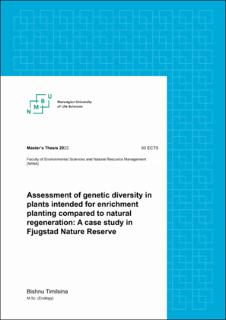| dc.description.abstract | European ash (Fraxinus excelsior) is facing severe population decline due to ash dieback disease, which not only poses a threat to the existence of this keystone species but also to more than 480 other species associated with it directly or indirectly. The disease's spread rate and extent of damage exceed the rate of regeneration, necessitating management actions to conserve the forest. Enrichment planting with relatively resistant plants can boost evolutionary stability and mitigate the dieback crisis. However, it's essential to genetically assess the enrichment planting materials to ensure their representativeness and sufficiency in diversity compared to the degraded forest.
Our study analyzed the genetic diversity of 100 samples from Danish origin grown in nurseries for enrichment plantation using 12 microsatellite loci. We compared results from these samples with 99 samples from Fjugstad Nature Reserve, 50 collected before the heavy dieback infestation in 2012, and 49 from 2022. The Fjugstad population's genetic diversity did not change before and after the heavy infection, but the coefficient of inbreeding was lower after the infestation, possibly due to the clearing of the canopy and middle layer in the forest, facilitating better pollen flow, seed dispersal and hence gene flow. The genetic diversity of the Fjugstad and Danish populations was also similar, except for higher private allelic richness and expected heterozygosity in the Danish population. moreover, both Fjugstad and Danish population had overlapping allele frequency which complements the genetic diversity of the Fjugstad forest. Additionally, the higher private allelic richness in the Danish population may offer tolerance against dieback, contributing to the forest's genetic tolerance and boosting its population. These findings suggest that Danish reproductive materials are representative and complementary to the genetic diversity of the Fjugstad population, aiding in conservation efforts and evolutionary stability of the declining ash forest in Fjugstad. | |
